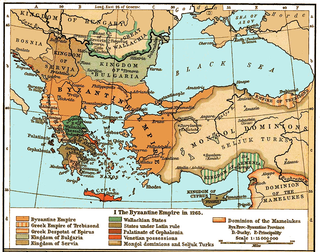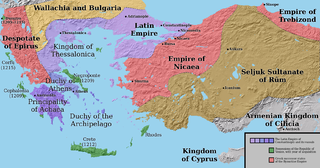Related Research Articles

Andros is the northernmost island of the Greek Cyclades archipelago, about 10 km (6 mi) southeast of Euboea, and about 3 km (2 mi) north of Tinos. It is nearly 40 km (25 mi) long, and its greatest breadth is 16 km (10 mi). It is for the most part mountainous, with many fruitful and well-watered valleys. The municipality, which includes the island Andros and several small, uninhabited islands, has an area of 380 km2 (146.719 sq mi). The largest towns are Andros (town), Gavrio, Batsi, and Ormos Korthiou.

The Duchy of the Archipelago, also known as Duchy of Naxos or Duchy of the Aegean, was a maritime state created by Venetian interests in the Cyclades archipelago in the Aegean Sea, in the aftermath of the Fourth Crusade, centered on the islands of Naxos and Paros. It included all the Cyclades. In 1537 it became a tributary of the Ottoman Empire, and was annexed by the Ottomans in 1579; however, Christian rule survived in islands such as Siphnos and Tinos.
The Prince of Achaea was the ruler of the Principality of Achaea, one of the crusader states founded in Greece in the aftermath of the Fourth Crusade (1202–1204). Though more or less autonomous, the principality was never a fully independent state, initially being a vassal state subservient of the Latin Empire of Constantinople, which had supplanted the Byzantine Empire, and later the Kingdom of Naples.
Carlo I Tocco was the hereditary Count palatine of Cephalonia and Zakynthos from 1376, and ruled as the Despot of Epirus from 1411 until his death on July 4, 1429.

The War of the Euboeote Succession was fought in 1256–1258 between the Prince of Achaea, William II of Villehardouin, and a broad coalition of other rulers from throughout Frankish Greece who felt threatened by William's aspirations. The war was sparked by William's attempt to gain control of a third of the island of Euboea, which was resisted by the local Lombard barons with the aid of the Republic of Venice. The Lord of Athens and Thebes, Guy I de la Roche, also entered the war against William, along with other barons of Central Greece. Their defeat at the Battle of Karydi in May/June 1258 effectively brought the war to an end in an Achaean victory, although a definite peace treaty was not concluded until 1262.
Angelo Sanudo was the second Duke of the Archipelago from 1227, when his father, Marco I, died, until his own death.
Marco II Sanudo was the third Duke of the Archipelago from 1262 to his death.

The County Palatine of Cephalonia and Zakynthos existed from 1185 to 1479 as part of the Kingdom of Sicily. The title and the right to rule the Ionian islands of Cephalonia and Zakynthos was originally given to Margaritus of Brindisi for his services to William II, King of Sicily, in 1185.

The Frankokratia, also known as Latinokratia and, for the Venetian domains, Venetokratia or Enetokratia, was the period in Greek history after the Fourth Crusade (1204), when a number of primarily French and Italian states were established by the Partitio terrarum imperii Romaniae on the territory of the dissolved Byzantine Empire.
Cecilia Venier was suo jure lady of Paros in 1531-1537. She was the last ruler of Paros before it was conquered by the Ottoman Empire in 1537.
Fiorenza Sommaripa was a Latin noblewoman of the Aegean islands.
Crusino I Sommaripa was lord of the islands of Paros and later Andros in the Duchy of the Archipelago.
Gian Giacomo Crispo (1446–1453) was the fourteenth Duke of the Archipelago, etc., from 1447 to 1453, son of the thirteenth Duke Giacomo II Crispo and Ginevra Gattilusio.
Pietro Zeno, was lord of Andros from 1384 until his death in 1427, and a distinguished diplomat in the service of the Republic of Venice.

The Battle of the Echinades was fought in 1427 among the Echinades islands off western Greece between the fleets of Carlo I Tocco and the Byzantine Empire. The battle was a decisive Byzantine victory, the last in the Empire's naval history, and led to the consolidation of the Peloponnese under the Byzantine Despotate of the Morea.
Marino Dandolo was a Venetian nobleman and first Latin ruler of the island of Andros following the Fourth Crusade. He was a member of the prominent Dandolo family. He accompanied Marco Sanudo on the conquest of the Aegean Islands in 1207, and was awarded the island of Andros as a sub-fief. He was expelled from his island around 1239 by Geremia Ghisi, and died in exile before August 1243.
Dorotheus I was the Greek Orthodox metropolitan bishop of Athens from ca. 1388 to 1392, and the first to reside in the city since 1205.
Crusino II Sommaripa was the lord of Andros from 1468 until 1488, succeeding his brother Giovanni.
The Second Parliament of Ravennika was convened in May 1210 by Latin Emperor Henry of Flanders in the town of Ravennika in Central Greece in order to resolve the differences between the princes of Frankish Greece and the Roman Catholic clergy of their domains.
Francesca Morosini, was a Duchess consort of Naxos by marriage to John II Crispo. She served as regent of Naxos during the minority of her son Giacomo II Crispo from 1433.
References
- ↑ Miller 1908, p. 611.
- ↑ Setton 1978, p. 292.